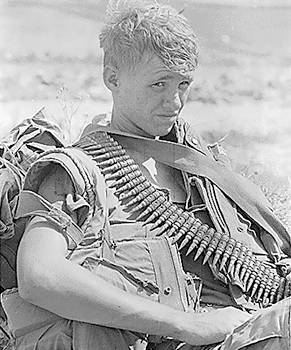 After spending two years in combat, Tim O'Brien was very familiar with the life of a foot soldier. His short story "Where Have You Gone, Charming Billy?" explores a soldier's thoughts and feelings during his first days on the ground in Vietnam.
After spending two years in combat, Tim O'Brien was very familiar with the life of a foot soldier. His short story "Where Have You Gone, Charming Billy?" explores a soldier's thoughts and feelings during his first days on the ground in Vietnam.
Do a close reading of the story's first two paragraphs--make sure you know what happened, but also think about why O'Brien starts the story in this way.
Now use the questions below to practice close reading skills.
|
Paraphrase the passage. The first step for close reading is to express the meaning of what you just read--in your own words. How would you restate what is happening in the first paragraph? A platoon of 26 men are walking across the countryside in Vietnam. The platoon stops and the men sit down to rest. The men feel different things about their night excursion--some are excited, some are tired, and some are frightened. Private First Class Paul Berlin, the main character, is afraid because he saw Billy Boy Watkins die earlier that day. He pretends that instead of being in the war, he is camping with his dad. Identify the purpose of the passage. After summarizing what happened in the passage, try to figure out what the passage is supposed to convey or accomplish. What does the author want you to understand, think, or feel about the characters or events in this story? The author wants readers to feel sympathy for Paul Berlin, who is new to the army and the war and has probably never seen someone die before. Describe the technique used in the passage. Now think about how the author gets his or her message across. What approach or method does Tim O'Brien use to convey his message in the story's introduction? In the first paragraph, O'Brien doesn't come right out and say that Paul Berlin is frightened. Instead, he describes Paul's coping mechanism--pretending that he is not in the middle of a war. The author also mentions the death of Billy Boy Watkins twice. These two details help readers infer that Paul Berlin is terrified. Locate evidence for your claims about the passage. What words, sentences, details, or other examples support the idea that O'Brien wants readers to infer that Paul Berlin is terrified? O'Brien says twice that Paul wishes he were not in the war, and he brings up Billy Boy Watkins' death twice in the same paragraph. The repetition of these details adds to the anxiety readers are encouraged to see in (and perhaps feel for) Paul. |
